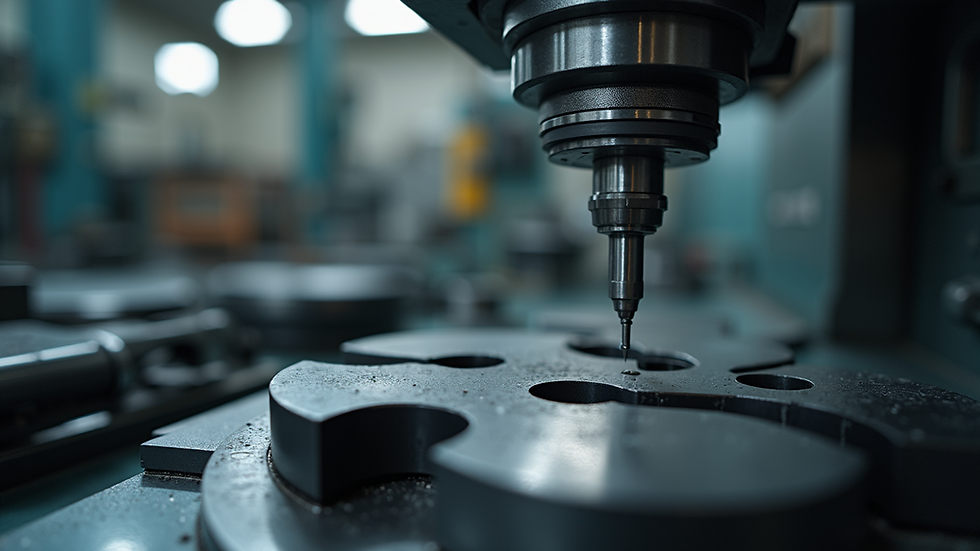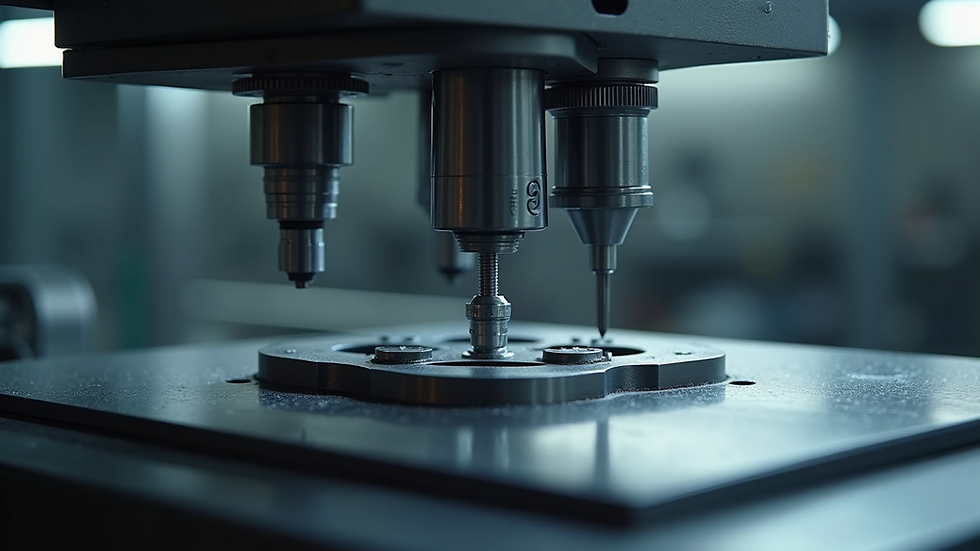Precision Machining Services: Ensuring Quality in Every Detail
- K+G Industrial Group

- Jul 7, 2025
- 4 min read
Updated: Jul 7, 2025
Precision machining plays a critical role in various industries, from aerospace to automotive. Its importance in manufacturing processes cannot be overstated, as even the smallest imperfections can lead to major failures. In this blog post, we will explore the intricacies of precision machining services, highlighting why they are essential for ensuring high-quality output.
Precision Machining Insights
Precision machining focuses on the removal of material to create components that adhere to tight tolerances. These services leverage advanced technology and skilled craftsmen to deliver superior-quality parts. With a variety of techniques, we can cater to unique specifications that meet industry standards.
At K+G Industrial Group, quality assurance is at the heart of our precision machining. We invest in rigorous inspection techniques, such as coordinate measuring machines (CMM) and laser scanning. These methods ensure that every component is not only functional but meets the design specifications meticulously.
To better understand the value of precision machining, let's delve into what a precision machinist does and explore various processes involved in this significant industry.

What Does a Precision Machinist Do?
A precision machinist is a skilled tradesperson specialized in creating parts and components through various machining processes. Their work ensures that each piece not only fits perfectly but also performs optimally. Here are some key responsibilities of a precision machinist:
Interpreting Technical Drawings: Machinists begin their work with blueprints or CAD designs. They interpret these technical drawings to understand the specific dimensions and tolerances required for each part.
Setting Up Machines: Once they have the specifications, machinists set up and calibrate machines for production. This includes adjusting speeds, feeds, and cutting tools to ensure quality output.
Machining Parts: Using tools such as lathes, mills, and CNC machines, they produce parts by removing material from a workpiece. The precision involved in this process is vital to create components that fit within strict tolerances.
Quality Control: Continuous quality checks are a significant part of a machinist’s job. They measure and inspect parts using tools like calipers and micrometers to ensure they meet specifications.
Troubleshooting: When issues arise, machinists need to diagnose problems with machines or the components being produced. They work to find effective solutions to maintain production quality.
Understanding these functions gives insight into the critical role of precision machinists at K+G Industrial Group. Their attention to detail and expertise are crucial for the success of projects across various sectors.

Types of Precision Machining Processes
There are several processes involved in precision machining, each suitable for specific applications. Here’s a closer look at some key types:
CNC Machining: Computer Numerical Control (CNC) machining uses computer software to control machine tools. This automation allows for high precision and repeatability, making it ideal for large-scale manufacturing.
Turning: In turning, a workpiece spins on a lathe while a cutting tool removes material. It is perfect for creating cylindrical parts such as shafts and bearings.
Milling: Milling is a process where rotary cutters remove material from a stationary workpiece. It is versatile and can create complex shapes and features.
Grinding: This involves using abrasive wheels to achieve high dimensional accuracy. Grinding is often the final step to enhance surface finishes or ensure precision fit.
Electrical Discharge Machining (EDM): EDM removes material through electrical discharges. This method is particularly useful for hard metals and intricate shapes.
By leveraging these processes, manufacturers can produce components that precisely match specifications while maximizing efficiency.

Importance of Quality in Precision Machining
Quality assurance is non-negotiable in precision machining services. Even the smallest deviation in tolerances can result in product failure, leading to safety concerns and costly recalls. Here’s why quality matters:
Safety: In industries like aerospace and medical, compromised parts can lead to catastrophic failures. Precision machining ensures that parts meet the highest safety standards.
Performance: Quality components improve efficiency and performance. For example, finely machine parts can reduce friction and wear in moving assemblies.
Reputation: Companies that prioritize quality gain a competitive edge. Clients and customers trust businesses that deliver high-quality products, fostering long-term relationships.
Cost-Effectiveness: Investing in precision machining means fewer errors and reworks. This efficiency translates to cost savings both in production and post-production processes.
Compliance: Many industries must adhere to strict regulatory standards. Upkeeping quality through precision machining ensures businesses remain compliant with necessary regulations.
Actionable Recommendations for Quality Assurance
To ensure quality within K+G Industrial Group's precision machining processes, we adhere to the following:
Regular Calibration: Machines are regularly calibrated to maintain accuracy. Implement a routine maintenance program to keep machinery in optimal condition.
Invest in Technology: Use of advanced tools and software capable of monitoring and reporting machining processes in real-time. This investment will facilitate quality assurance.
Training and Skills Development: Provide regular training for machinists to keep them updated on the latest techniques and technologies. Skilled workers are essential for high-quality output.
Robust Inspection Protocols: Develop comprehensive inspection protocols that include both in-process and final inspections. This ensures every part meets stringent quality standards.
Collaboration with Suppliers: Work closely with suppliers to ensure raw materials meet quality specifications. Quality starts at the source, so it is essential to ensure every component is up to standard.
By following these recommendations, businesses can optimize their precision machining efforts, significantly improving the quality of their output.
Final Thoughts on Precision Machining Services
In conclusion, precision machining services play an essential role in ensuring quality in manufacturing at K+G Industrial Group. Through skilled craftsmanship, modern technology, and rigorous quality assurance, precision machining produces high-quality components critical to various industries. Understanding the depth of this process—from the role of the machinist to the different types of machining—helps K+G Industrial Group's executive team develop strategies to optimize their operations.
By continuing to enhance quality assurance methods and embracing advancements in technology, K+G Industrial Group will remain competitive in the ever-evolving manufacturing landscape. If you are looking for top-notch precision machining services, consider calling in the experts who can efficiently meet your unique manufacturing needs. Learn more about how they can refine your production processes at KG Industrial Group.




